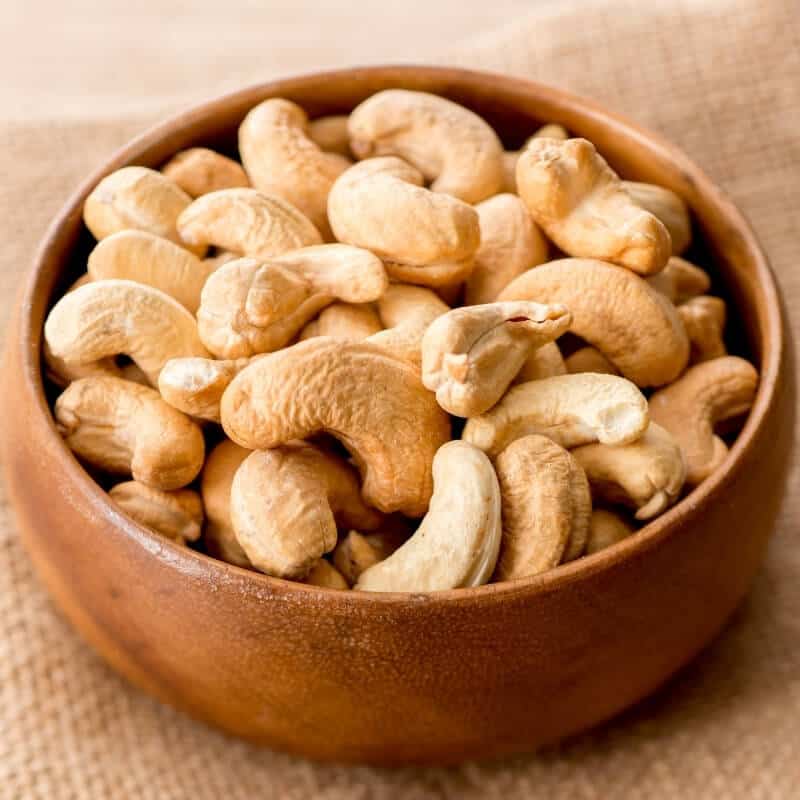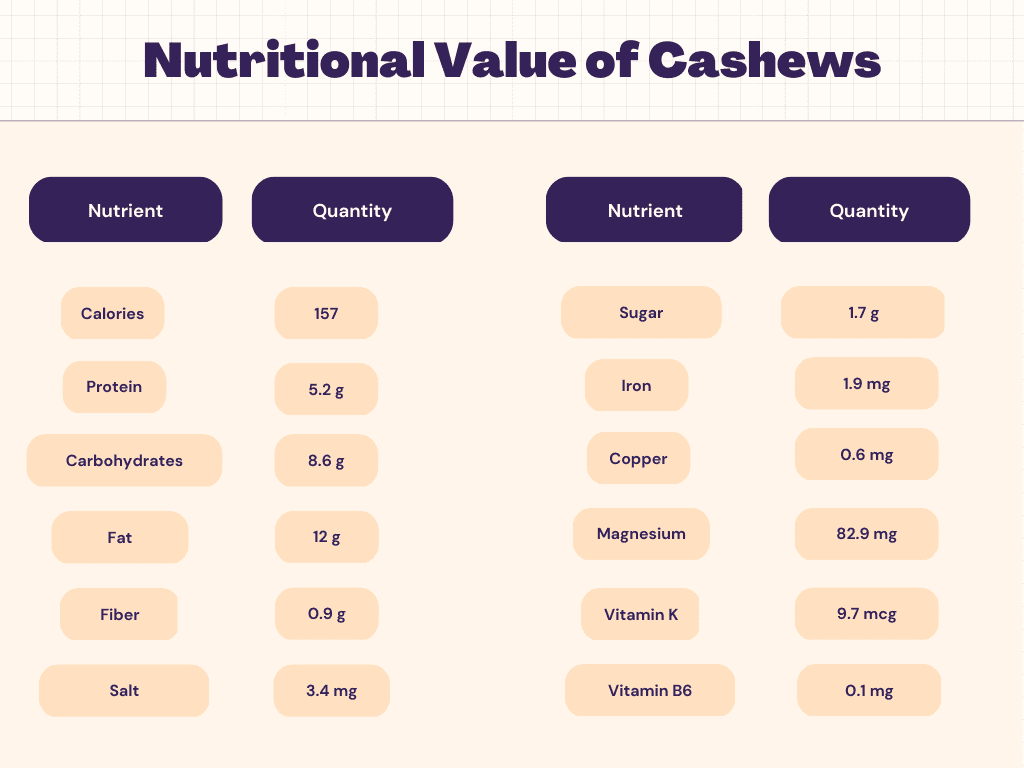Cashews are frequently used in nut mixes, eaten as a snack on their own, and processed into goods like cashew butter and milk. When used in moderation, cashews can be a nutritious supplement to your diet.
Nutritional Value of Cashew
Nutritional Facts of Cashew
Carbs
157 calories and just under 9 grams of carbohydrates are included in one serving. Starch makes up the majority of the carbs in cashews. The majority is sugar, with a tiny bit of fiber.
Fat
Fat makes up the majority of the calories in cashews. If you eat the entire ounce, there are 12 grams of fat in a serving. 6.8g of polyunsaturated fat makes up the majority of the fat (2.2g).
Protein
A serving of cashew nuts has slightly more than 5 grams of protein. In order to compare, peanuts, which have more than 7 grams of protein per one-ounce serving, have more protein than cashews.
Calories
The 157 calories in one ounce (28g) of raw, unsalted cashews are made up of 67% fat, 21% carbohydrates, and 12% protein.
Health Benefits Of Cashew
Helps with weight control – If you’re attempting to lose weight, nuts can be a wise snack. Nuts’ beneficial fat, protein, and fiber content may aid in promoting satiety and fullness after meals and during snacking. Yet, due to their high-calorie content, nuts should only be eaten in moderation. Check our Weight Loss Plans.
Helps with cholesterol reduction – The health advantages of cashews and other nuts are due to their fatty acid profiles, vegetable proteins, fiber, vitamins, minerals, carotenoids and phytosterols.
Reduces risk of Gallstones – Nuts like cashews help lower the risk of gallstones. This is probably because of the bioactive elements, especially the fiber, minerals and unsaturated fatty acids.
Helps with diabetes prevention and management – Those with diabetes who consume cashews had superior insulin sensitivity, a lower cholesterol ratio, higher HDL cholesterol, and lower systolic blood pressure. Check our Diabetes Plans.
Increases heart health – Like all nuts, cashews are high in fat, but they also include poly- and monounsaturated fats, a beneficial type of fat that, when ingested in moderation, can improve heart health and lower cholesterol levels.
Helps in the prevention of copper deficiency – After meat and shellfish, cashews are one of the best food sources of copper. For people who consume a plant-based diet and may be at risk for copper deficiency, this makes them the perfect choice. Almost two-thirds of the body’s copper is found in the skeleton and muscles, which are important for the health of bones and muscles.
Vitamins & Minerals in Cashew
Vitamin K (approximately 12% of your daily needs) is found in cashew nuts. Consuming cashews will also help you get thiamin and vitamin B6. Magnesium, phosphorus, copper and manganese, all occur abundantly in cashews, which are also a good source of zinc and iron.
The Bottom Line
Although it is native to Brazil, the cashew nut is also grown in Vietnam, Nigeria, India, and the Ivory Coast. The nut is a byproduct of the Anacardium occidentale, an evergreen cashew tree that also produces a fruit (also known as an apple) and a nut (also known as a seed), which hangs beneath the fruit.
FAQs
How many Cashews can I eat in a day?
The recommended daily intake of cashews is 15 to 18 for maximum health benefits. Indeed, cashew nuts offer a variety of other nutritional advantages. These nuts are fantastic as nutritious snack foods. Cashew nuts are loaded with nutrients and a fantastic source of plant-based protein and heart-healthy lipids.
Should I eat Cashews before or after exercise?
Every athlete needs cashews because they are a terrific, lean source of protein and carbohydrates to help fuel your exercises. Raw cashews include more carbohydrates (8g per ounce!) and less fat than most nuts.
What are the benefits of Cashews?
- Helps with weight control
- Helps with cholesterol reduction
- Reduces risk of Gallstones
- Helps with diabetes prevention and management
- Increases heart health
- Helps in the prevention of copper deficiency
What is the best time to eat Cashews?
If you’re searching for a pick-me-up after a long day at work, snacking on cashews, pistachios, and pine nuts makes more sense because they still provide energy but don’t have a lot of calories. This is because they have lower protein contents but still provide energy boosts.
 Livofy (formerly Keto India) Seen On Shark Tank!
Livofy (formerly Keto India) Seen On Shark Tank! 









